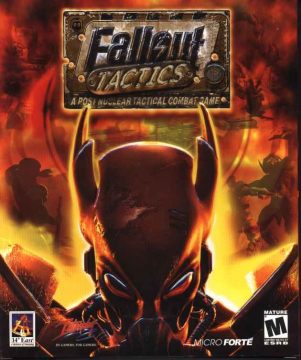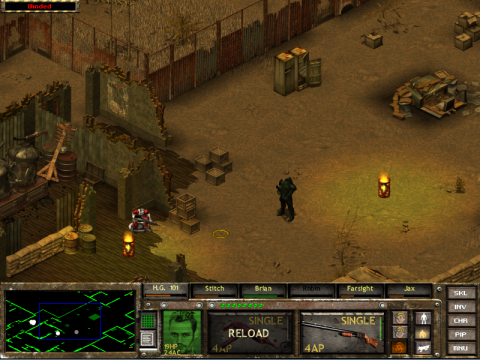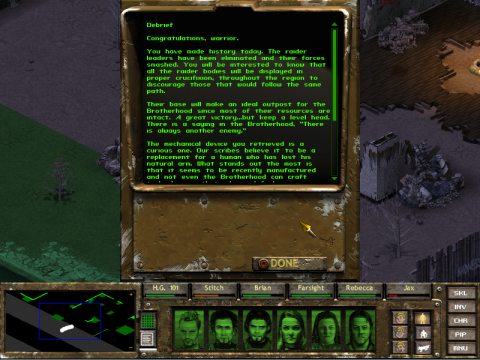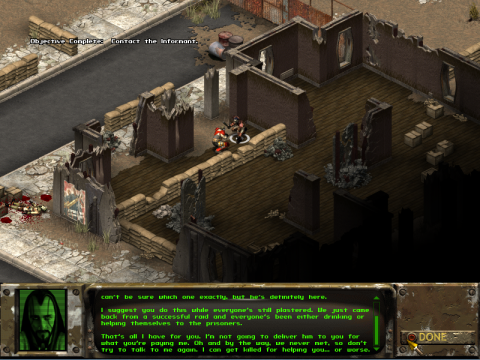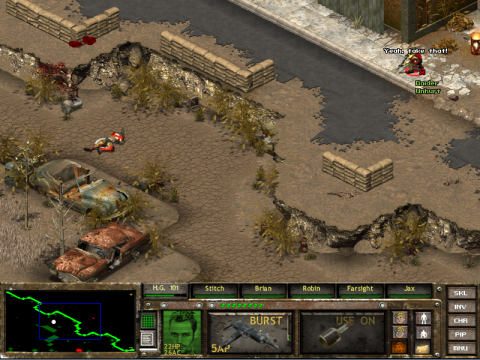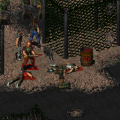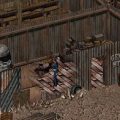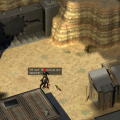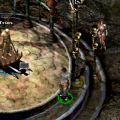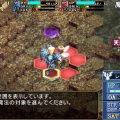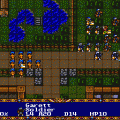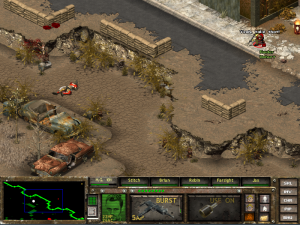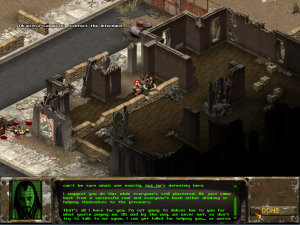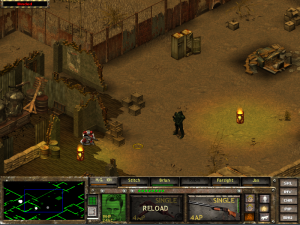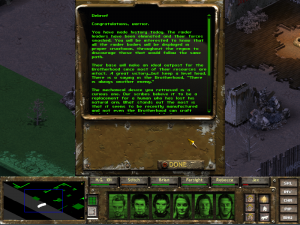Fallout Tactics: Brotherhood of Steel (usually referred to as simply Fallout Tactics to avoid confusion with another game called Fallout: Brotherhood of Steel) is a Fallout spinoff focused on squad-based combat. Unlike other games in the series, it allows for multiplayer gameplay and has a three different combat modes: continuous turn-based (which is a really strange way of saying ‘real time’), squad turn-based (combat is divided into player’s phase and enemy’s phase) and individual turn-based (similar to Fallout and Fallout 2, with characters taking turns depending on initiative).
Tactics tries to adapt Fallout’s SPECIAL system to stealth-heavy real-time (optional turn-based mode is activated only while in combat) tactics gameplay not unlike Commandos: Behind Enemy Lines. The player’s squad is always outnumbered by the enemies and needs to avoid enemy patrols, set up ambushes and avoid triggering an alarm. Positioning your squad is always an important concern, both to gain tactical advantage (encircling enemies, gaining higher ground) and to avoid friendly fire. Keeping in line with Fallout tradition, scavenging is an important part of the game as apparently Brotherhood of Steel doesn’t give equipment to its members, forcing them to buy everything instead – and you’ll want to have a lot of stimpaks, ammo and a decent armor at all times. Of course most of those things are a bigger concern near the beginning of the game than near the end as it’s not impossible to make a small fortune and buy all the best items the quartermaster has to offer.
SPECIAL system in Tactics is very similar to that of Fallout, although some changes to the skills have been made. As the game’s not heavy on dialog, there’s no speech skill and instead, it’s possible to raise your piloting skills which allows controllindg vehicles. Fallout’s number-crunchy combat mechanics translate pretty well to the game’s careful tactical gameplay, although many of the non-combat skills end up underutilized as all your squadmates are likely to end up with ‘small guns’ maxed out.
Fallout Tactics suffers from slow pacing which while not uncommon to the genre, ends up feeling quite annoying because of how slow the movement of your squad is when hiding behind cover or crawling (those positions affect your visibility and combat effectiveness – prone position is good for the aforementioned crawling as well as sniping, hiding behind cover is helpful during shootouts and standing is the only position with no melee penalty). The pacing, along with terrible pathfinding (so bad that it often results in your squadmates dying), is the main issue spoiling the enjoyment of sneaking and fighting through the game’s large, usually well-designed levels.
The plot of Fallout Tactics is focused on a Brotherhood of Steel chapter which was reassigned to Midwest because of a political conflict: unlike ‘mainstream’ Brotherhood, they supported the idea of recruiting members of local tribes. The game’s protgaonist, The Warrior, is one such tribal recruit but the open-mindedness of Tactics Brotherhood goes further as it’s possible to have ghoul, super mutant, deathclaw and robot squadmates.
The game’s story is much more linear when compared to mainline Fallout titles. While you can travel around the world map, this open world element is just a small nod towards other games in the series as those places on the map aren’t really towns, cities or villages – they’re levels which you have to complete or bases in which you spend time between missions. As a result, the structure of the story is completely different: instead of many more or less independent stories connected by a less developed central plot we now have something much more traditional. Fallout Tactics is not about life after the apocalypse, it’s about Brotherhood of Steel, search for a secret Vault and an evil computer powered by human brains. The game has a few possible endings but they’re determined by a smaller than usual number of variables: decisions made during the last missions and your karma.
While none of those things are bad by themselves, the biggest problem here is how dull the presentation is. While Fallout was able to tell many things about the game’s world through a short ‘war never changes’ monologue, Fallout Tactics begins with a lengthy, detailed narration about the history of Brotherhood of Steel. Before each mission, you get a debriefing about your objectives and their context in larger storyline but most of them (until Calculator shows up, which is quite late in the game) aren’t too interesting and neither is the way they’re told. The game has a lot of voice acting but it’s slow, boring and wooden – especially when compared to previous games. Occasionally, the game makes attempts at humor – usually of the crude kind (e.g. in one of the levels, you can rescue a tribal who complains about getting an STD while being a sex slave of a female bandit but he doesn’t trust BOS medics and prefers to cure it with oil and fire) – but unlike Fallout 2 it usually ends up forced and unfunny because of the quality of both writing and voice acting.
All in all, Tactics is not a bad game but it is far from the quality level of Fallout and Fallout 2. It’s not a mindlessly stupid cash-in (this will come later) but it lacks ambition (and polish, but this can be said about most of the games in the series). It looks quite nice, its soundtrack is a decent approximation of Fallout and Fallout 2 music despite being made by Inon Zur instead of Mark Morgan, and its plot touches upon some of the themes the series is known for. But it’s not an outstanding game by any measure and it can sometimes get pretty tedious. It might be worth playing if you really enjoyed combat in the first two games but don’t expect it to be as good.
There was a sequel to this game planned, with a plot inspired by Day of the Triffids, the Doctor Who episode Seeds of Doom, and the video game Fountain of Dreams (a disappointing pseudo-sequel to the original Wasteland) but it was never developed because of Tactics’ low sales.

